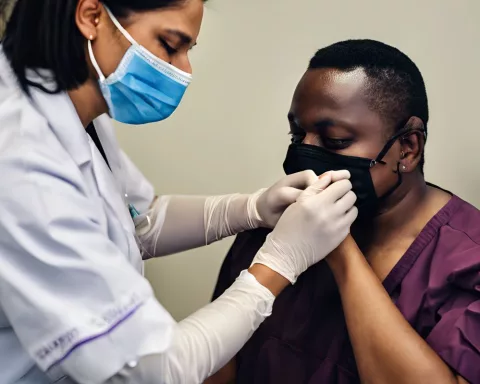Monkeypox, a virus related to smallpox, has evolved to include sexual transmission in addition to transmission through physical contact with infected animals, respiratory droplets, and scratches or bites. Symptoms include fever, rash, muscle aches, and swollen glands and can be fatal in severe cases. While treatments like Tecovirimat are available for severe cases, prevention through hand hygiene and seeking medical attention at the earliest sign of symptoms is critical to managing the spread of the disease. Monkeypox does not discriminate by gender, age, or sexual orientation.
The New Face of Monkeypox
In 2022, the World Health Organisation reported an international Monkeypox outbreak, revealing a novel transmission path – sexual contact. However, physical proximity, exposure to respiratory droplets, or scratches and bites from infected beings can also transmit the virus. Monkeypox symptoms include fever, rash, muscle aches, and swollen glands. The virus doesn’t discriminate by gender, age, or sexual inclination.
Monkeypox, a viral infection with roots that trace back to smallpox, has been known for its lesser severity compared to its genetic predecessor. However, it doesn’t mean it’s any less harmful. Until 2022, Monkeypox, formerly known as Mpox, was primarily transmitted through direct engagement with infected animals like rodents or via animal bites. However, a seismic shift appeared in 2022, transforming the transmission pattern of this virus significantly.
The New Face of Monkeypox
The World Health Organisation (WHO) pinpointed an international outbreak of Monkeypox in 2022, revealing a novel transmission path – sexual contact. This was indeed a crucial evolution, but it’s pivotal to understand that this isn’t the sole transmission method. The infection can still be contracted through physical proximity, exposure to respiratory droplets, or scratches and bites from infected beings.
The WHO published a report in August 2023 that recorded the global Monkeypox death toll since the 2022 outbreak at 186, which translates to a fatality rate of less than 1%. Fast forward to 2024, South Africa confirmed half a dozen new Monkeypox cases, bringing the total number to 13 since the first case was identified in May of the same year. These reported cases were primarily traced to Gauteng and Western Cape, yet the death count in the region remained unchanged at two.
Monkeypox: Unbiased to Gender
It’s critical to understand that Monkeypox doesn’t discriminate by gender. Most recorded cases in South Africa involved men engaging in sexual activities with other men, often identified during their visits to sexual health services or other healthcare appointments within primary or secondary care premises. The initial case reported in 2024 was a 35-year-old male from Gauteng.
Presently, South Africa hasn’t registered any Monkeypox treatments. However, the WHO advises the use of Tecovirimat, also known as TPOXX, primarily for severe instances. This advice is particularly valid for individuals with low CD4 counts, less than 350. The South African Health Products Regulatory Authority (Sahpra) has approved this treatment for acute cases.
Ongoing Efforts to Manage Monkeypox
In a recent announcement, the health department disclosed its receipt of a batch of Monkeypox-specific remedy, Tecovirimat – also known as TPOXX or ST-246, intended to treat patients suffering severe complications due to Monkeypox. It’s also working on procuring additional treatment options, including vaccines if necessary. However, it emphasised that mild cases would still be managed with supportive treatment for complications like fever, pneumonia, and skin infections.
The government encourages everyone to visit a healthcare facility if they suspect Monkeypox symptoms or have been in close proximity with a Monkeypox-infected individual. This virus does not discriminate by gender, age, or sexual inclination and is preventable and treatable. To control the spread of this disease, officials are emphasising the importance of hand hygiene. They are advising people to wash their hands with soap and water or use an alcohol-based sanitizer before eating, touching their faces, or after using the restroom.
Recognising Monkeypox
Monkeypox symptoms include a rash that may last two to four weeks, fever, headache, muscle aches, back pain, fatigue, and swollen glands. The rash can be incredibly painful and might resemble blisters or sores. These can appear on numerous body parts, including the face, palms, soles of the feet, the groin, and other parts. It’s vital for everyone to be aware of these symptoms, as everyone is susceptible to this disease. At the earliest sign of any symptom, medical advice must be sought.
What is Monkeypox?
Monkeypox is a virus related to smallpox that primarily transmits through physical contact with infected animals, respiratory droplets, and scratches or bites. It can cause symptoms such as fever, rash, muscle aches, and swollen glands and can be fatal in severe cases.
How is Monkeypox transmitted?
Monkeypox can be transmitted through physical contact with infected animals, respiratory droplets, scratches or bites, and sexual contact. It doesn’t discriminate by gender, age, or sexual orientation.
What are the symptoms of Monkeypox?
The symptoms of Monkeypox include fever, rash, muscle aches, back pain, fatigue, and swollen glands. The rash can resemble blisters or sores and can appear on various body parts, including the face, palms, soles of the feet, the groin, and other parts.
How is Monkeypox treated?
Treatments like Tecovirimat are available for severe cases of Monkeypox. However, mild cases are managed with supportive treatment for complications like fever, pneumonia, and skin infections. The South African Health Products Regulatory Authority (Sahpra) has approved Tecovirimat for acute cases.
How can Monkeypox be prevented?
Prevention of Monkeypox involves hand hygiene and seeking medical attention at the earliest sign of symptoms. Officials are emphasising the importance of hand hygiene and advising people to wash their hands with soap and water or use an alcohol-based sanitizer before eating, touching their faces, or after using the restroom.
Is Monkeypox deadly?
Monkeypox can be fatal in severe cases, but the global Monkeypox death toll since the 2022 outbreak is 186, which translates to a fatality rate of less than 1%. It’s essential to seek medical attention at the earliest sign of symptoms to manage the spread of the disease.












